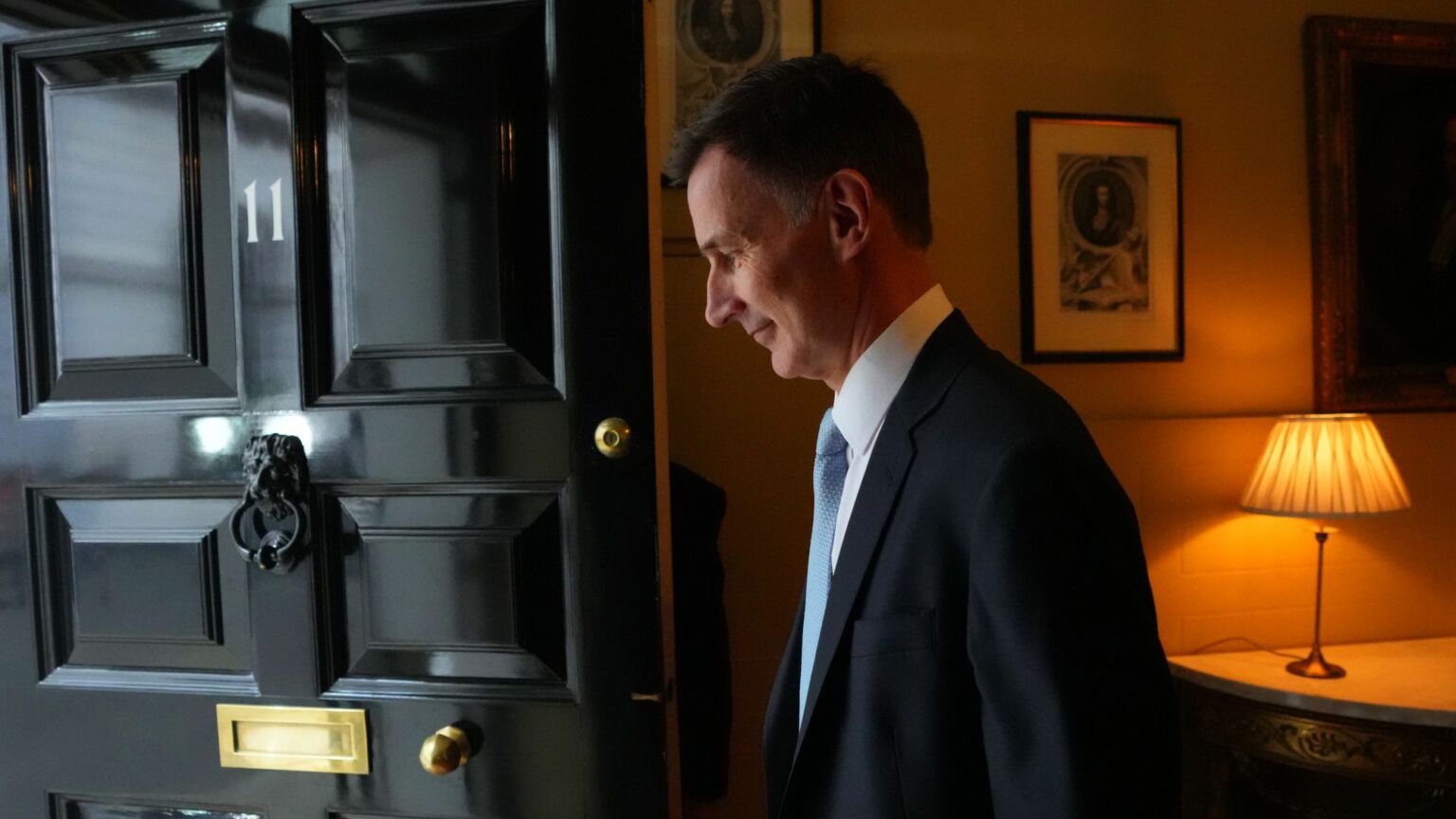Does the OBR run this country?
Jeremy Hunt is hiding behind the unelected ‘experts’.

The UK desperately needed something bold and innovative from this week’s spring budget. The nation’s infrastructure is literally crumbling, the energy grid is overloaded and local authorities are going bankrupt. The economy and public services are simply not working.
Of course, it would have been naive in the extreme to expect any answers to these problems from the current moribund Tory government – even as a General Election looms. And, given the UK’s stagnant economy, any chancellor would have struggled to conjure up the resources to fix all of this now in a single budget.
Still, chancellor Jeremy Hunt’s budget was a uniquely paltry affair, even by his past standards. He and prime minister Rishi Sunak tucked and turned for weeks trying to come up with some tax-cutting measure that might earn pre-election headlines. In the end, Hunt announced a further 2p reduction in national-insurance contributions. As welcome as any tax cut is to hard-pressed workers, this one is surely no more likely to revive economic growth – or the Tories’ dismal opinion-poll numbers – than when he instituted precisely the same measure in his autumn statement last year.
Some have blamed the paucity of the chancellor’s budget statement on the Office for Budget Responsibility (OBR), the ‘independent’ watchdog that determines whether the chancellor is sticking to his so-called fiscal rules. Senior Conservatives have reportedly become ‘dismayed at the influence over their political fate wielded by unelected economists’. They say that the UK’s fiscal watchdog had the chancellor in a ‘headlock’. They point to how, in the run-up to the budget, the OBR’s deteriorating economic forecasts limited Hunt’s scope to make the big tax cuts they think they need to save their seats.
As Tim Shipman, chief political commentator at The Sunday Times, explains, over the past six weeks, the OBR ‘has provided half a dozen updates’ on the government’s so-called fiscal headroom – ‘and each has left the government with less money’. When the chancellor first started drawing up the budget, the OBR estimated there would be about £30 billion he could use for extra tax cuts or extra spending, without breaching his targets for cutting future debt. In the OBR’s final forecast before the chancellor’s statement, the headroom was down to about £12.5 billion.
People involved in the budget process have described the ‘agony’ they felt as policies were ditched because of the OBR’s progressively worsening reports. Hunt himself said that the OBR’s fiscal forecasts had ‘moved against us’, which supposedly narrowed his options. He contrasted this with the lead up to the autumn statement, when the OBR guesstimates ‘went in our favour, unexpectedly, quite close to the end’. This allowed him to announce £20 billion of cuts in national-insurance contributions and business taxation.
This frustration with the OBR is understandable. The forecasts of these unelected technocrats have gained an extraordinary influence on economic policymaking – despite the fact that they are so often wide of the mark. This is extremely unhealthy for democracy.
But we should also be wary of demonising the messenger. And ultimately, that is all the OBR is. It is our political elites who have invested its forecasts with so much authority. As such, any suggestion of ‘external’ constraints should be rebuffed, as it lets our elected leaders shirk responsibility for their own decisions.
The OBR was established in 2010 by David Cameron and George Osborne. Its creation was in line with the post-1980s trend of politicians outsourcing decision-making to ‘expert’ bodies. Politicians did this in order to insulate themselves and their choices from public criticism. Just as in 1998, New Labour gave authority over monetary policy to a newly ‘independent’ Bank of England, the Tories gave the OBR the authority to assess the government’s fiscal policy.
Similarly, the first chancellor to openly subject his budgets to ‘fiscal rules’ was Gordon Brown in 1997. Despite the fact the chancellor can rewrite these rules as he pleases (we are currently on the ninth set of rules), these too are treated as sacrosanct. Indeed, this is where the OBR comes into play.
By statute, the OBR is required to produce economic forecasts for the next five years. It then applies these forecasts to test each budget against the government’s own fiscal rules. The OBR then reports to the chancellor on how much ‘headroom’ it projects for additional spending or for tax cuts.
The key fiscal rule set by the current government is to cut debt as a share of GDP between the fourth and fifth year of the forecast. It is this rule that caused the chancellor and prime minister to keep chopping and changing their budget plans as they responded to each new OBR forecast. Every time the forecasts were downgraded, the implicit message from the government was that it had ‘no choice’ but to keep taxes high or to rein in public spending.
Hunt and Sunak were more than happy to give the impression that their hands were tied. Influential commentators went along with this pretence, too. BBC economics editor Faisal Islam accepted that ‘Mr Hunt is not fully in charge of this budget, and his power to make people feel better off and have more money to spend is limited by the decisions of bodies outside of his control’.
But the chancellor can make different choices, should he wish to. The OBR is not ‘outside’ of government control. It is the artificial creation of politicians. It could be closed down tomorrow through new legislation. Or it could simply be ignored. It is worth noting that, even according to the OBR’s statutory charter, the ‘government retains the right to disagree with the OBR’s forecasts’. What the chancellor lacks is not the power to go against the OBR, but rather a vision for transforming the economy, and the will and courage to implement it.
It’s time for our elected politicians to start taking responsibility for the economy again. The outsourcing of economic policy to ‘experts’ has done nothing to improve our prospects, but it has severely damaged democracy. Sadly, as the spring budget shows, our politicians remain desperate to avoid all accountability.
Phil Mullan’s Beyond Confrontation: Globalists, Nationalists and Their Discontents is published by Emerald Publishing. Order it from Emerald or Amazon (UK).
Picture by: Getty.
To enquire about republishing spiked’s content, a right to reply or to request a correction, please contact the managing editor, Viv Regan.









Comments
Want to join the conversation?
Only spiked supporters and patrons, who donate regularly to us, can comment on our articles.